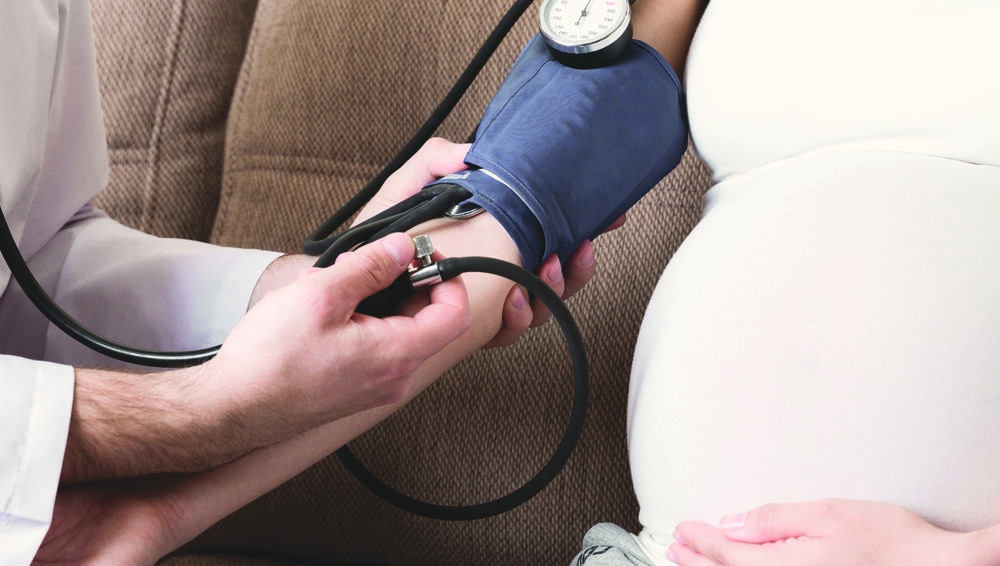6 Reasons high blood pressure is a problem during pregnancy
Insights

Monitoring your blood pressure is an important part of prenatal care.
If you have high blood pressure, it should be well controlled to avoid further complications.
How to measure your blood pressure
Measuring blood pressure is easy. There are many automated blood pressure (BP) monitors that you can wear on your wrist or arm to check your blood pressure daily.
Normal blood pressure is a systolic reading of less than 120 mmHg (millimeters of mercury) and a diastolic reading of less than 80 mmHg. There are three stages of chronic hypertension:
- Elevated blood pressure refers to a systolic reading between 120 and 129 mmHg and a diastolic reading below 80 mm Hg. In some cases, elevated blood pressure gets worse over time unless steps are taken to control blood pressure.
- Stage 1 hypertension refers to a systolic pressure ranging from 130 to 139 mm Hg or a diastolic pressure ranging from 80 to 89 mmHg.
- Stage 2 hypertension refers to a systolic pressure of 140 mm Hg or higher or a diastolic pressure of 90 mm Hg or higher. There are three levels/grades: Mild (140-159/90-99), moderate (160-179/100-109), and severe (a reading of 180/110mmHg or higher).
If you don’t have high blood pressure before getting pregnant, your caregiver will still check your blood pressure at every prenatal visit. If your blood pressure reading shows 140/90 mm Hg or higher on two or more occasions (at least four hours apart) when you’re over 20 weeks of pregnancy, it is considered gestational hypertension. If, in addition to the high blood pressure, there’s evidence of organ damage, such as protein in the urine (kidney), it is called preeclampsia. When high blood pressure is diagnosed before the 20th week of pregnancy or before becoming pregnant, it is usually chronic hypertension.
Why is high blood pressure a problem during pregnancy?
High blood pressure during pregnancy poses a lot of risks to both the mother and the baby. These are some of them:
- Decreased blood flow to the placenta: High blood pressure can reduce blood supply to the placenta. If that happens, your baby might receive less oxygen and fewer nutrients, which can lead to slow growth or intrauterine growth restriction and other problems.
- Low birth weight: This results from reduced blood flow to the placenta and the resultant poor nutrient and oxygen supply. The baby suffers intrauterine growth restriction and would eventually be born with a low birth weight.
- Injury to maternal other organs: When hypertension is not well controlled, it can damage the mother’s major organs, including the brain, heart, lungs, kidneys, liver, and other major organs. This can be life-threatening in severe cases.
- Placental abruption: Preeclampsia increases the risk of placental abruption, a condition in which the placenta separates from the inner wall of the uterus before delivery. If severe, it can cause heavy bleeding, which can be life-threatening to both mother and baby.
- Premature delivery: In some situations, early delivery is needed to prevent potentially life-threatening complications.
- Future cardiovascular disease: Preeclampsia increases the risk of future heart and blood vessel (cardiovascular) disease in the mother. The more the number of times the mother has had preeclampsia or premature birth due to having high blood pressure during pregnancy, the higher the risk of future cardiovascular disease.
How to reduce the risk of complications
You reduce the risk of complications by doing the following:
- Keeping your prenatal appointments: You must keep your prenatal appointments throughout your pregnancy.
- Taking your blood pressure medication as prescribed: Your doctor will prescribe the safest medication at the most appropriate dose. If you had a hypertensive disorder in a prior pregnancy, your doctor might recommend a daily low-dose aspirin (81 -150 milligrams) beginning late in your first trimester.
- Eating healthily: You may work with a nutritionist to get the best diet for your situation.
- Staying active: Follow your health care provider’s recommendations for physical activity.
- Staying off certain substances: Avoid alcohol, cigarettes, and illicit drugs. Also, make sure you talk to your health care provider before taking over-the-counter medications.
Labor and breastfeeding with high blood pressure
If you’re taking medicine throughout pregnancy to control your blood pressure, follow the advice of your doctor on whether to continue during labor — usually that’s what is recommended. For mild to moderate hypertension, you should be able to have a vaginal delivery, but in some severe cases, your doctors may recommend a cesarean section.
Breastfeeding is encouraged for most women who have high blood pressure, even those who take medication. But your doctor may have to make some adjustments to the medications.
Verified:
Dr. Wanwadee Sapmee Panyakat (OB-GYN), license no. 41208 (1 June 2022)



